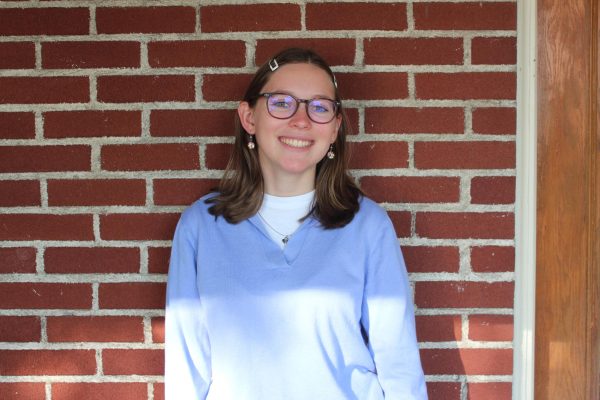Students enrolled in Environmental Activism (ENST 246) have started a campaign to address on-campus food insecurity, launching the initiative with a rally outside of the ELC on Thursday, April 24. Other actions by the group included a direct meeting with Dean of Students Moe McGuinness and the delivery of 240 paper plates to McGuinness’s office, symbolizing the estimated 2,400 Bucknell students who experience food insecurity.
The group has four demands that they are asking of the University: that McGuinness and other administrators read the 2021 Food & Nutrition Task Force Report; host a campus-wide Town Hall on food insecurity in Fall 2025; invite the Vice President of Finance to the Town Hall; and implement recommendations to improve B-Eats, the on-campus food pantry. These food pantry recommendations include improving communication and access to B-Eats, coordinating with the campus dietitian to ensure B-Eats offers inclusive food options, and reducing the stigma towards utilizing the food pantry through targeted outreach and education.
Students in the course were split into three core groups, which each organized one element of the campaign. The first group met with Dean McGuinness on the morning of April 24, in order to be able to directly express to her that food insecurity is an issue that matters to students. They presented her with their demands, and according to participant Grace Garvey ’25, “Dean McGuinness was very receptive to having this conversation with [them].”
Garvey continued, McGuiness “shared some of her past experiences working to fight food insecurity at her prior institution, the University of North Texas. She agreed to some of our demands, and we came away feeling as though she was genuine about her desire to help Bucknell students facing food insecurity.”
Later that same day, the second core group hosted the public launch event of the campaign: a rally in front of the ELC. Before the action officially started at 11:30 a.m., the group chalked messages including “fed up but not full,” “hungry for more” and “end food insecurity.” Core group members then collected student signatures on a petition and student testimonies on paper plates, which were later delivered to Dean McGuiness.
“Overall, we feel that our action was successful,” shared Hallie McClure ’26. “While many individuals who stopped by only stayed briefly, we encountered a significant number of people who were interested in the issue and wanted to get involved or sign the petition.”
McClure also noted that McGuinness was one of the first people to visit the launch event and that she was intentional to introduce herself to each of the group members. “The support we received from Maureen McGuinness early on was especially motivating, as she took the time to personally engage with the students directly,” she shared.
Finally, on May 1, the third core group did a silent demonstration, delivering the paper plates created at the rally. Each plate featured a statistic about food insecurity, a personal experience or related artwork. The goal of this form of demonstration was to provide students an opportunity to share their experiences and to create a visual for how many students are impacted by food insecurity, as each of the 240 plates represented 10 students who experience it here.
“A big focus of our event was to give students a way to express themselves and their experiences creatively,” said core group member Maria Chiappelli ’25. “Ultimately, it helped show the importance of representing a wide variety of experiences in our campaign.”
The estimate of 2,400 Bucknell students experiencing food insecurity comes from the Food & Nutrition Task Force, which was a group put together by President Bravman in the fall of 2020, “charged with making recommendations to increase access to affordable and nutritious food for all students.” The group carried out a detailed survey over nine months and, at the conclusion, proposed a number of meal plan structures and improvements to B-Eats (reflected in the ENST 246 demands) that they felt would reduce campus food insecurity. In their fall 2020 survey, the Task Force found that 63% of Bucknell students said that it was often or sometimes true that they were worried whether they could have all the meals they need per day.
ENST 246’s actions to address food insecurity at Bucknell come at the end of a semester in which students first learned about the history of environmental activism in the United States, took on individual challenges to better engage with the environment and discussed how past strategies have/have not been successful. Professor Andrew Stuhl then transitioned to help students build the specific skills needed to organize, lead and implement a campaign, before tasking students with doing so.
“I think that this course showed me a lot about the effective methods of nonviolent organizing,” said Garvey. “While our campaign is short run due to the semester coming to a close, I feel as though I have gained a strong skill set to help me in activism and community organizing in the future.”





















